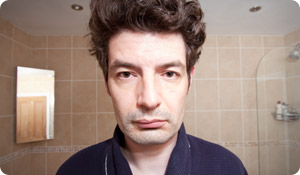
Sleep problems seem to be a national emergency, and neither gender has a lock on bad sleep habits. But there are a few behaviors of which men seem to be particularly guilty. Check out this list and see if any of these unsound practices sound familiar:
- Overdoing the caffeine. Caffeine can boost your mood, increase your productivity, and also keep you awake far longer than you should. But hitting the coffee machine throughout the day so you can keep up your crazy pace is not the healthiest move. You may power through the day, but chances are you'll "crash" at some point later. Or you may find the opposite-that coffee keeps you up past midnight. If you can't go cold turkey, try making some of your cups decaffeinated. Or substitute green tea for a few shots of java.
- Driving while drowsy. A late deadline at the office can take a serious toll on your driving ability. Many men shrug off fatigue and get behind the wheel, either because driving is part of their job or because they tend to do all the driving in the family. Ideally, you should nap before getting behind the wheel or ask someone else to share the driving. Other ways to stay alert: have a snack or stop to stretch your legs every hour or two.
- Eating too much at dinner. Research has shown that most people do best when they eat the bulk of their calories early in the day, but try telling a hungry man he'll have to make do with a salad and small piece of broiled chicken as his evening meal. Enjoying a hearty dinner may seem like every guy's right-but beware. Second helpings of spaghetti and meatballs topped off with half a loaf of garlic bread right before bed may cause heartburn and prevent you from sleeping well. If you're starving on your way home from work, take the edge off with a fruit and nut bar or a piece of fruit. You'll be less likely to overdo it when you get home.
- Snoring. This may be unconscious, but it's still a habit. Not only is snoring disruptive to your partner's sleep, it turns out that snoring may signal underlying sleep disorders that have sinister repercussions. Sleep apnea, a condition in which your throat tissue actually collapses into your airway and obstructs your breathing, can lead to heart disease, high blood pressure, and diabetes. Losing a few pounds may help, but for some people, the best solution is a special mask that keeps your airways open.
Source:
National Sleep Foundation, www.sleepfoundation.org.





